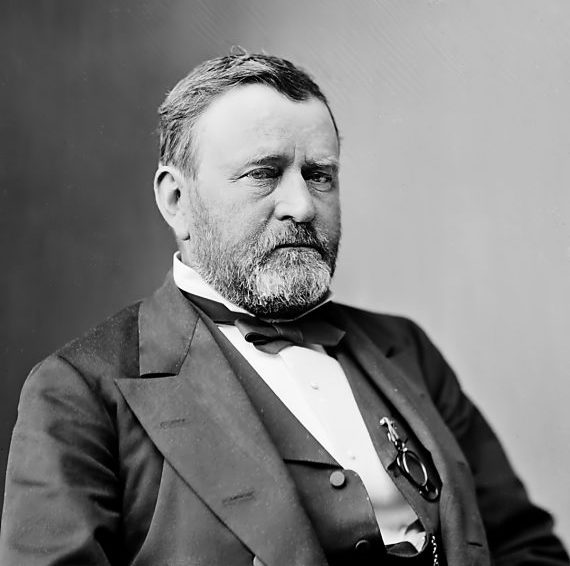A review of U.S. Grant’s Failed Presidency (Shotwell Publishing, 2019) by Philip Leigh
There was a time in recent memory when thoughtful people consistently ranked U.S. Grant’s presidency as one of the worst in history. The scandals, military Reconstruction, the mistreatment of the Plains Indian tribes, and the poor economy during the 1870s wrecked his reputation. That all began to change when “social justice” took center stage in the historical profession and Republican Party partisans sought to revitalize the dismal reputation of one of their most important presidents. After all, Grant was a Republican, and men like Karl Rove and Dinesh D’Souza will never grow tired of telling people it was the Republicans who saved America from those evil Southern traitors.
More importantly, historians like Ron Chernow, whose critically acclaimed biography of the 18th President sits on bookshelves across the United States, have sought to refocus attention on Grant’s “successes” rather than failures. Chernow places special emphasis on Grant’s attempts to protect former slaves during Reconstruction rather than the scandals which rocked not only his administration but which destroyed the United States economy and smacked of crony capitalism and the corruption that undergirds the practice. This type of feel good revisionism is part of a broad push to revitalize the reputations of the “active” presidents in American history, men like Polk and Jackson, those that embody the antithesis of what the founding generation designed for the executive branch.
This new love for U.S. Grant is unfounded. Philip Leigh provides a quick and punchy rebuttal to this hagiographic Grant revisionism in his U.S. Grant’s Failed Presidency.
Using the same sources as the revisionists, Leigh takes apart the thesis that Grant wanted to “protect” minorities in the United States. Leigh conclusively illustrates that like most Republicans at the time Grant’s sympathy for freedmen had to do more with winning elections than moral obligation or chivalry. Grant would not have won in 1868 without the freedmen vote, and both he and the Republican Party knew it. Leigh points to Republican policy toward American Indians and Chinese immigrants as proof of Republican hypocrisy on the issue of “civil rights.”
Leigh also argues that Grant had more to do with the economic corruption of the period than most realize. He gladly pursued both physical and economic reconstruction, promoted the interests of the Republican monied class and turned a blind eye to the rampant corruption among Northern “carpetbaggers” in militarily occupied Dixie. There is a reason Grant was shown in an infamous political cartoon as a conquering emperor riding on the back of the barefoot South in a carpetbag supported by United States troops. Leigh considers that to be the real Grant, not the trumped up image pushed by Ron Chernow.
This nicely illustrates that the protectors of the American empire on both the left and the right have a vested interest in promoting the imperial presidency as a sort of good tyrant king. To them, Grant could be a Pericles riding to the rescue of the American experiment, the great citizen general who rid America of the backward agrarian Southern Spartans.
Except Grant was never that magnanimous or heroic, and his presidency was little more than a political rubber stamp for the revolutionaries who were radically remaking American society in the 1860s and 1870s. Leigh contends that you can’t understand Reconstruction without understanding Grant. That is certainly true.
It might be easy to have a tinge of sympathy for Grant, the uncouth general who never cared for politics, voted Democrat, but through war was elevated to the presidency in one of most bitterly partisan eras of American history. Grant, according to this interpretation, was a “Victim,” (as opposed to a “victim”) an unwilling participant in a larger drama over the spoils of war. Leigh paints a different picture, a Grant that understood the stakes and actively pursued a partisan agenda with Republican victory more important than principles or the Constitution. In other words, Grant was like every other “active” president in the imperial era, and like Lincoln chose party over union and the Constitution.
There had to be winners and losers, and Grant ensured the South was not only defeated but punished. That was Grant’s decades long legacy south of the Mason-Dixon, and even in the North, his adherence to the radical Republican agenda helped give rise to the populist revolt of the 1890s.
The original historical presidential rankings with Grant near the bottom may be the only time I agree with the “establishment” assessment of the American executive. Grant should be perpetually buried at the bottom.
Leigh has added a nice counterweight to the modern attempt to portray Grant as some type of righteous cause acolyte deserving of fawning praise.
If you’re looking for a concise history of the Grant administration without the modern propensity for over-saturated “presentism,” skip Chernow and read Leigh. It is by far the best summary of his administration in the last half-century.







